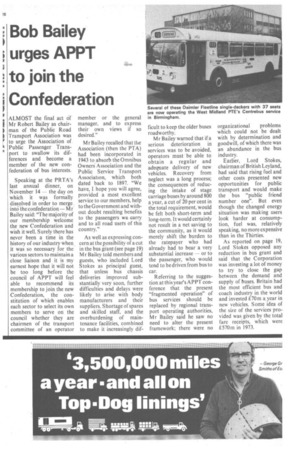Bob Bailey urges APPT to join the Confederation
Page 28

If you've noticed an error in this article please click here to report it so we can fix it.
ALMOST the final act Of Mr Robert Bailey as chairman of the Public Road Transport Association was to urge the Association of Public Passenger Transport to swallow its differences and become a member of the new confederation of bus interests.
Speaking at the PRTA's last annual dinner, on November 14 — the day on which it was formally dissolved in order to merge . into ihe confederation — Mr Bailey said: "The majority of our membership welcome the new Confederation and wish it well. Surely there has never been a time in the history of our industry when it was so necessary for the various sectors to maintain a close liaison and it is my earnest hope that it will not be too long before the council of APPT will feel able to recommend its membership to join the new Confederation, the constitution of which enables each sector to select its own members to serve on the council whether they are chairmen of the transport committee of an operator member or the general manager, and to express their own views if so desired."
Mr Bailey recalled that the Association (then the PTA) had been incorporated in 1943 to absorb the Omnibus Owners Association and the Public Service Transport Association, which both dated back to 1897. "We have, I hope you will agree, provided a most excellent service to our members, help to the Government and without doubt resulting benefits to the passengers we carry and to all road users of this country," As well as expressing concern at the possibility of a cut in the bus grant (see page 19) Mr Bailey told members and guests, who included Lord Stokes as principal guest, that unless bus chassis deliveries improved substantially very soon, further difficulties and delays were likely to arise with body manufacturers and their suppliers. Shortage of spares and skilled staff, and the overburdening of maintenance facilities, combined to make it increasingly dif ficult to keep the older buses roadworthy.
Mr Bailey warned that if a serious deterioration in services was to be avoided, operators must be able to obtain a regular and adequate delivery of new vehicles. Recovery from neglect was a long process; the consequences of reducing the intake of stage carriage buses by around 800 a year, a cut of 20 per cent in the total requirement, would be felt both short-term and long-term. It would certainly not result in a net saving to the community, as it would merely shift the burden to the ratepayer who had already had to bear a very substantial increase — or to the passenger, who would tend to be driven from bus to car.
Referring to the suggestion at this year's APPT conference that the present "fragmented operation" of bus services should be replaced by regional transport operating authorities, Mr Bailey said he saw no need to alter the present framework; there were no organizational problems which could not be dealt with by determination and goodwill, of which there was an abundance in the bus industry.
Earlier, Lord Stokes, chairman of British Leyland, had said that rising fuel and other costs presented new opportunities for public transport and would make the bus "public friend number one". But even though the changed energy situation was making users look harder at consumption, fuel was, relatively speaking, no more expensive than in the Thirties.
As reported on page 19, Lord Stokes opposed any reduction in bus grant and said that the Corporation was investing a lot of money to try to close the gap between the demand and supply of buses. Britain had the most efficient bus and coach industry in the world and invested £70m a year in new vehicles. Some idea of the size of the services provided was given by the total fare receipts, which were 1:570m in 1973.




















































































































